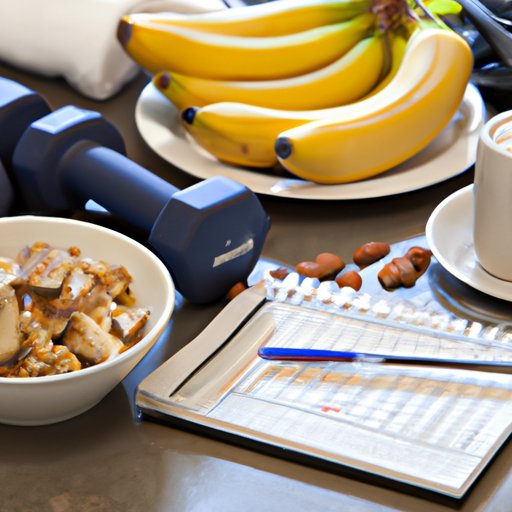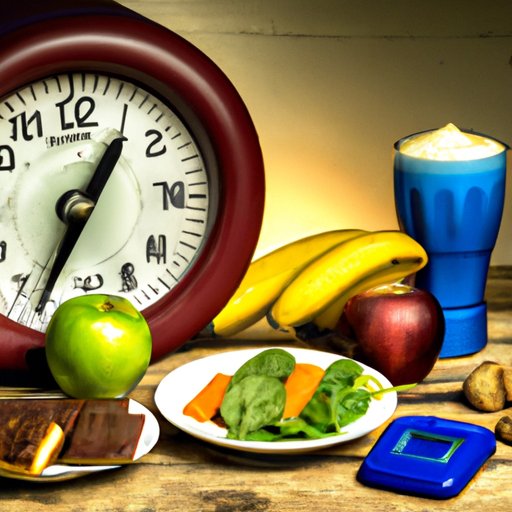Introduction
It’s no secret that proper nutrition is essential for achieving optimal performance in any physical activity. But when it comes to exercising, when and what you eat can have a major impact on your results. Eating before working out can help provide your body with the fuel it needs to get through your routine and maximize your efforts. In this article, we’ll explore the importance of eating before exercise, what types of foods you should be consuming, and how to plan your pre-workout meals for maximum benefit.

Eating Before Working Out: What You Need to Know
Before delving into the specifics of meal timing, let’s take a moment to review the general benefits of eating before exercise. When you eat before working out, you provide your body with the energy it needs to perform at its best. This energy helps you lift heavier weights, run faster, and increase your endurance during longer workouts. Eating also provides your body with essential nutrients, such as carbohydrates and proteins, which can help repair and build muscle.
When it comes to choosing the right foods to eat before a workout, there are several factors to consider. Carbohydrates are essential for providing your body with energy, so complex carbs such as oatmeal, whole wheat toast, or sweet potatoes are great options. Protein is also important for muscle building, so lean meats, eggs, and nuts are ideal choices. Fruits and vegetables are also good sources of vitamins and minerals, which can help boost your overall performance. Finally, it’s important to stay hydrated by drinking plenty of water throughout the day, especially before and after exercising.
Pre-Workout Meal Planning: How Long Before Exercise Should You Eat?
Now that you know what types of food to eat before a workout, the next step is to figure out when to eat them. Generally speaking, the ideal time to eat before exercising is about one to three hours before the start of your workout. This gives your body enough time to digest the food and convert it into energy. If you don’t have enough time to wait that long, try having a smaller snack 30 minutes to an hour before your workout. Just make sure to avoid high-fat or high-fiber foods, as these can cause stomach discomfort during exercise.
When planning your pre-workout meals, it’s important to consider the type of exercise you’ll be doing. For example, if you’re going for a long run or bike ride, a larger meal with more carbohydrates is recommended. On the other hand, if you’re doing a shorter, high-intensity workout such as weight lifting, a smaller snack with protein and carbs is preferable. It’s also important to factor in any other activities you may be doing during the day. If you’ll be engaging in strenuous activities throughout the day, make sure to spread out your meals accordingly to ensure you have enough energy for each activity.
The Ideal Time to Eat Before Exercise: A Guide
As a general guide, here are some tips for timing your pre-workout meals:
- For an intense workout lasting less than an hour, aim to eat something light 30 minutes to an hour before your workout.
- For a moderate workout lasting between one and two hours, aim to eat a slightly larger meal one to two hours before your workout.
- For a long, vigorous workout lasting more than two hours, aim to eat a large meal two to three hours before your workout.
It’s also important to note that everyone’s body is different, so what works for one person may not work for another. Experiment with different meal times and sizes to find out what works best for you.

Fuel Up Before Exercising: When and What to Eat
Now that you know when to eat before exercising, let’s take a look at the types of food you should be consuming. When it comes to pre-workout nutrition, the key is to focus on nutrient-dense foods that will provide your body with the fuel it needs to perform at its best. Here are some of the most important nutrients to consider:
- Carbohydrates: These provide your body with energy for both short-term and long-term exercise. Complex carbohydrates, such as oatmeal, brown rice, and quinoa, are ideal for providing sustained energy over a longer period of time. Simple carbohydrates, such as fruits and yogurt, are better for providing quick energy for shorter workouts.
- Protein: This is essential for helping your body repair and build muscle. Lean proteins, such as chicken, fish, and eggs, are great options for pre-workout meals.
- Healthy fats: Healthy fats, such as olive oil, avocados, and nuts, are important for maintaining energy levels and providing essential vitamins and minerals.
In addition to macronutrients, it’s also important to make sure you’re getting sufficient amounts of vitamins and minerals. Fruits and vegetables are great sources of these micronutrients, which can help boost your overall performance.
Eating Before Exercise: Timing is Everything
While eating before exercising is essential for optimizing your performance, it’s also important to pay attention to the timing of your meals. Eating too close to a workout can lead to stomach discomfort and indigestion, which can hinder your performance. To avoid this, make sure to give yourself enough time to digest your food before beginning your workout. As a general rule, it’s best to wait at least one to two hours after eating before starting your exercise routine.
If you’re still concerned about stomach discomfort during exercise, there are a few strategies you can use to minimize this. First, try avoiding high-fat or high-fiber foods, as these can be difficult to digest. Second, opt for smaller snacks or meals that are easier to digest. Finally, make sure to stay hydrated by drinking plenty of water throughout the day.

Maximize Your Workouts: Eating the Right Foods at the Right Time
At the end of the day, the key to maximizing your workouts is finding the right balance of nutrients for your individual needs. The best way to do this is by experimenting with different meal timing and sizes to see what works best for you. It’s also important to make sure you’re getting enough of the right types of nutrients—namely, carbohydrates, proteins, and healthy fats—to provide your body with the fuel it needs to perform at its best.
Conclusion
Eating before working out is essential for optimizing your performance and achieving your fitness goals. When planning your pre-workout meals, it’s important to consider the type of exercise you’ll be doing and the amount of time you have to digest your food. Aim to eat a balanced meal of complex carbohydrates, lean proteins, and healthy fats one to three hours before your workout, and make sure to stay hydrated throughout the day. With the right combination of timing, nutrition, and hydration, you’ll be well on your way to reaching your fitness goals.
(Note: Is this article not meeting your expectations? Do you have knowledge or insights to share? Unlock new opportunities and expand your reach by joining our authors team. Click Registration to join us and share your expertise with our readers.)
